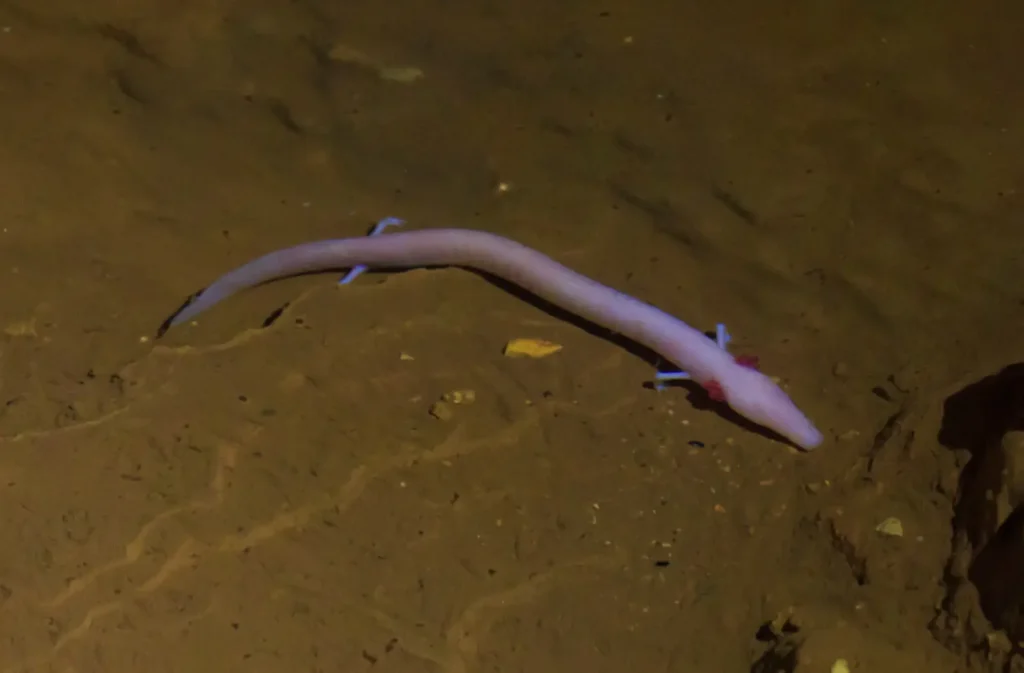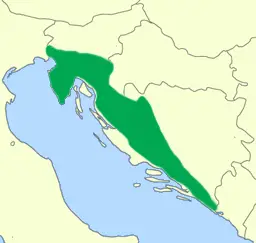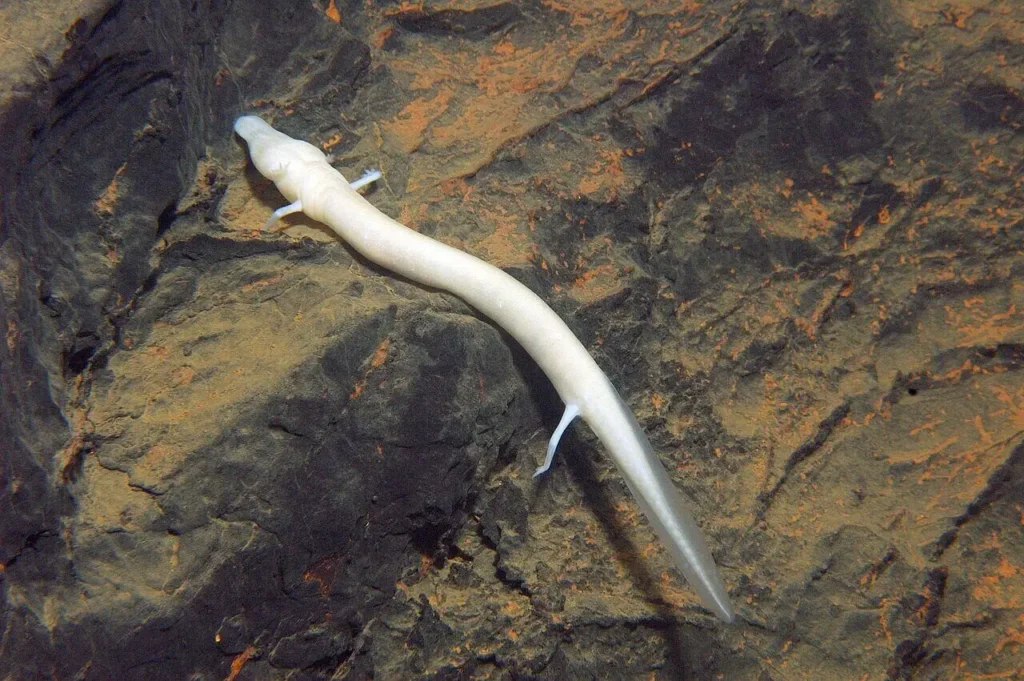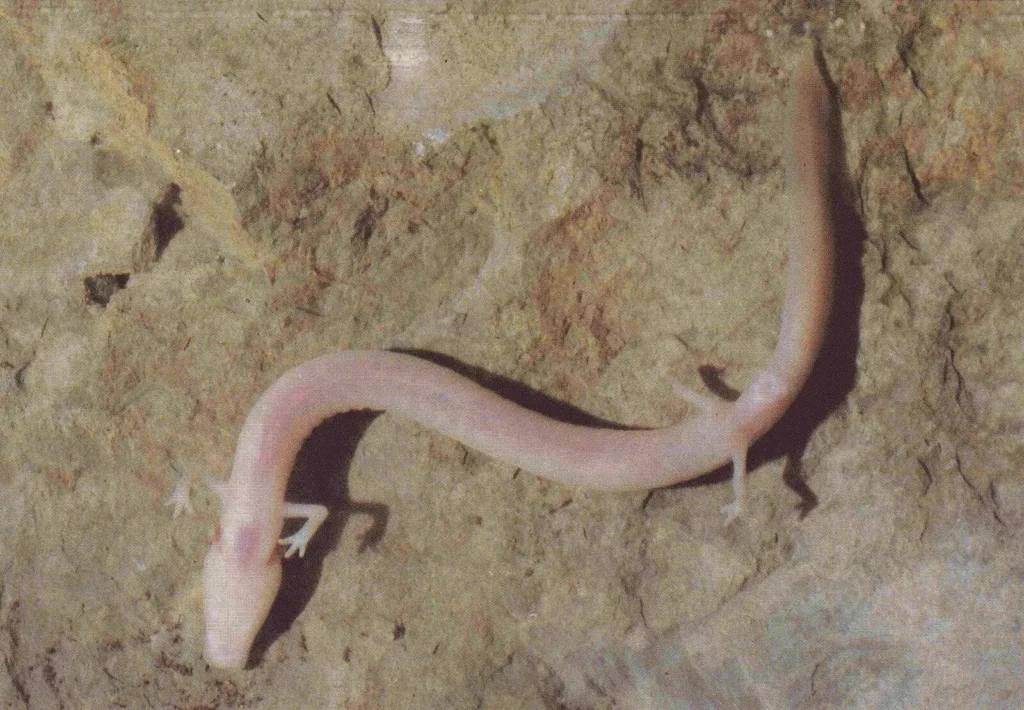European Proteus (Proteus anguinus) is a unique amphibianwhich has been shrouded in legends for centuries. This creature is called "man-fish", "cave dragon" or "living fossil organism" because of its exceptional adaptation to life in the underground waters of karst caves.
📌 What makes Proteus unique?
✔ Lives in total darkness - it lives exclusively in underground reservoirs
✔ Blind - eyes reduced through life in caves
✔ It breathes like a fish and like an amphibian - has gills and lungs
✔ Centenarian - lives above 100 years old
✔ Can fast for up to 10 years
📌 This mysterious organism is a symbol of Slovenian nature and an important object of scientific research.
In this article, we will look at biology, behavior, adaptation features, and threats to this rare species.

Scientific classification
✔ The Kingdom: Animals (Animalia)
✔ Type: Chordal (Chordata)
✔ Class: Amphibians (Amphibia)
✔ Row: Tailed amphibians (Caudata)
✔ Family: Proteas (Proteidae)
✔ Gender: Proteus (Proteus)
✔ View: Proteus anguinus
📌 This is the only representative of the genus Proteus!
Appearance and body structure
🦎 Special features:
✔ Long, eel-like body - 20-30 cm long
✔ Reduced eyes - covered with leather
✔ Pink or whitish skin - devoid of pigment
✔ External gills - red color, resemble twigs
✔ Tiny limbs - 3 fingers on the front paws, 2 on the back
🔹 Color scheme
✔ In the wild – pinkish
✔ Under the influence of light – darkens and becomes pigmented
📌 Because of their color and appearance, the locals believed that the proteas were "baby dragons" coming out of caves after the rains.

Living environment
🌍 Where does it live?
✔ Cave systems of the Balkan Peninsula
✔ Slovenia, Italy, Croatia, Bosnia and Herzegovina, Montenegro
✔ Lives in underground rivers and lakes
🔹 Living conditions
✔ Water temperature: 5–15°C
✔ Oxygen environment: rich in dissolved oxygen
✔ Low amount of food - requires special adaptations
📌 Proteas prefer water protected from pollution and are very sensitive to environmental changes.
Life in the Dark: adaptations
🌑 How did Proteus adapt to cave life?
✔ The eyes are reduced - covered with skin and do not function
✔ Developed sense of smell and touch - uses sensitive receptors
✔ Electroreception - detects weak electric fields from mining
✔ Slow metabolism - allows you to survive when there is a lack of food
📌 Proteas are almost blind, but their olfactory organs and lateral line help them navigate in the dark.

Diet and behavior
🍽 What does it eat?
✔ Small crustaceans, insects, larvae
✔ Worms, shellfish
✔ Sometimes eats its own eggs or other proteas (if there is a lack of food)
🔹 Hunting
✔ Uses the sense of smell to find prey
✔ Feels vibrations in the water
✔ Able to wait a long time for prey without active movement
📌 Because of its slow metabolism, it can live without food for up to 10 years!
Reproduction and development
💖 How does it reproduce?
✔ Females lay eggs 10-70 eggs
✔ Sometimes they give birth live larvae
✔ Larvae develop in the water, gradually turning into adults
📌 Proteus reaches sexual maturity only at 14-18 years of age!
Life span
⌛ How long does proteus live?
✔ Average life expectancy-60-70 years
✔ Maximum recorded speed – more than 100 years old
📌 There is a record individual who lived in captivity for 102 years!
Threats to the species
⚠ Main threats:
✔ Groundwater pollution
✔ Tourism and destruction of cave ecosystems
✔ Poaching and catching for collections
📌 The European proteus is listed in the Red Book and is under protection!
Keeping in captivity
🏡 Can I keep Proteus at home?
✔ Proteas are difficult to keep in aquariums
✔ Needed clean, cool water
✔ Many countries prohibit the sale of protein
📌 Proteas live in specialized scientific centers and research laboratories.

Interesting facts about the European Proteus
💡 This is the only amphibian cave in Europe!
💡 Can live without food for 10 years!
💡 Caves with proteas-unique ecosystems that have existed for thousands of years!
💡 Proteus ' eyes respond to light, even though they don't function fully!
Conclusion
European Proteus – a unique creature that has adapted to underground life. He its extraordinary endurance, blindness and long life cycle make it one of the most mysterious amphibians in the world..
🔥 Proteas remind us how fragile nature can be – and how important it is to preserve the unique underground ecosystems of the Balkans! 🌊 🦎